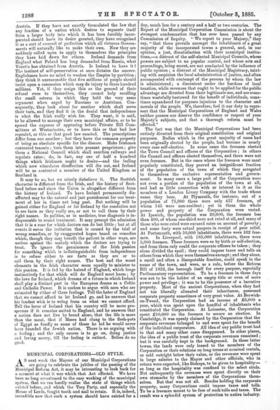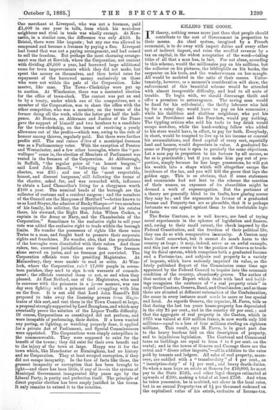MUNICIPAL CORPORATIONS—OLD STYLE.
AS next week the Mayors of our Municipal Corporations are going to celebrate the jubilee of the passing of the Municipal Reform Act, it may be interesting to look back for a moment at what it was which that Act effected. We have been so long accustomed to the easy working of the municipal system, that we can hardly realise the state of things which existed before, and which the Tory Party, and especially the House of Lords, fought tooth and nail to retain. It is, indeed, incredible now that such a system should have existed for a
day, much less for a century and a half or two centuries. The Report of the Municipal Corporation Commission is about the strongest condemnation that has ever been passed by any Commission of Inquiry. "We report to your Majesty," they say, "that there prevails amongst the inhabitants of a great majority of the incorporated towns a general, and, in our opinion, a just, dissatisfaction with their municipal institu- tions,—a distrust of the self-elected Municipal Councils, whose powers are subject to no popular control, and whose acts and proceedings, being secret, are not conducted by the influence of public opinion ; a distrust of the Municipal Magistracy, taint- ing with suspicion the local administration of justice, and often accompanied with contempt of the persons by whom the law is administered ; a discontent under the burdens of local taxation, while revenues that ought to be applied for the public advantage are diverted from their legitimate use, and are some- times wastefully bestowed for the benefit of individuals, some- times squandered for purposes injurious to the character and morals of the people. We, therefore, feel it our duty to repre- sent that the Municipal Corporations of England and Wales neither possess nor deserve the confidence or respect of your Majesty's subjects, and that a thorough reform must be effected."
The fact was that the Municipal Corporations had been entirely diverted from their original constitution and original purposes. Bodies which in the great majority of cases had been originally elected by the people, had become in nearly every case self-elective. In some cases the freemen elected the Town Council and officers of the Corporation ; in others the Council and officers elected themselves, and there were not even freemen. But in the cases where the freemen were most popularly constituted, they proved an insignificant fraction of the population of the town of which they arrogated to themselves the exclusive representation and govern- ment. In many cases a large part of the Corporation were not even a portion of the population of the town at all, and had as little connection with or interest in it as the members of a London Livery Company with the trade whose name they bear. At Plymouth, for instance, out of a population of 75,000 there were only 437 freemen, of whom 145 were non-resident ; yet in them the whole power and property of the Corporation were vested. At Ipswich, the population was 20,000, the freemen less than 400, of whom one-third were not rated at all, and many of those who were rated were excused rates on account of poverty ; and some forty were actual paupers in receipt of poor relief. At Portsmouth, with 50,000 inhabitants, there were 102 free- men. In Liverpool, with 185,000 inhabitants, there were 5,000 freemen. These freemen were so by birth or self-election, and from them only could the corporate officers be taken ; they alone divided the spoil ; they could impose taxes and tolls on others from which they were themselves exempt; and they alone, a small and often a disreputable fraction, could speak in the name of the town, and were, as a rule, before the Reform Bill of 1832, the borough itself for every purpose, especially Parliamentary representation. To be a freeman in those days was not to be the holder of an empty title or even of mere power and privilege ; it was to be the possessor of a lucrative property. Most of the ancient Corporations, when they had not too liberally alienated their inheritance, possessed corporate property sometimes of very great value. At Ber wick- on-Tweed, the Corporation had an income of £6,000 a year, which was spent upon the handful of inhabitants who constituted the Corporation. At Leicester, the Corporation spent £10,000 on the freemen to secure an election. In Cambridge, it was openly claimed by the Corporation that the corporate revenues belonged to and were spent for the benefit of the individual corporators. All idea of any public trust had in that and many other cases disappeared. In other places, the idea of a public trust of the corporate revenues remained ; but it was carefully kept in the background. In these latter towns, the lands were only leased to the members of the Corporation or their relations on long terms at nominal rentals, or sold outright below their value, or the revenues were spent
in large salaries to the Mayor and other officials, who in return were expected, like Bishops, to be given to hospitality—
so long as the hospitality was confined to the select circle. Not unfrequently the revenues were spent directly on their own stomachs by the members of the Corporations them- selves. But that was not all. Besides holding the corporate property, many Corporations could impose taxes and tolls. To be a freeman meant to be free of such tolls and taxes. The result was a splendid system of protection to native industry.
One merchant at Liverpool, who was not a freeman, paid 11,400 in one year in tolls, from which his next-door neighbour and rival in trade was wholly exempt. At New- castle in a similar case, the difference was only £450. In Brist41, there were like imposts ; but any one was allowed to compound and become a freeman by paying a fine. Liverpool had found that was not a paying arrangement, and had ceased to sell the freedom. But perhaps the most charming arrange- ment was that at Berwick, where the Corporation, not content with dividing £6,000 a year, had borrowed large additional sums for town improvements which they did not make, but spent the money on themselves, and then levied rates for repayment of the borrowed money exclusively on those who were not within the pale of the Corporation. Like master, like man. The Town - Clerkships were put up to auction. At Winchester, there was a contested election for the office of town-clerk. The contest was put an end to by a treaty, under which one of the competitors, not a member of the Corporation, was to share the office with the other competitor, who was a member, on the terms of the former doing all the work, while the latter got half the half- pence. At Boston, an Alderman and Justice of the Peace gave the support of himself and two brothers to a candidate for the town-clerkship, on the terms of receiving a yearly allowance out of the profits—which was, owing to the rule of honour among thieves, regularly paid. But there were further profits still. The real raison d'être of a municipal freeman was as a Parliamentary voter. With the exception of Preston and Westminster, and a few other boroughs, where the " pot- walloper " came in, the election of Members of Parliament was vested in the freemen of the Corporation. At Aldborough, in Suffolk, "the regular price of 'an honest burgess ' " said Lord John Russell, "following the terms , of le charter, was £35; and one of the 'most respectable, honest, and discreet burgesses,' still following the terms of the charter' asked for, and was rewarded with, influence to obtain a Lord Chancellor's living for a clergyman worth £100 a year. The nominal heads of the borough are the collector of customs and a resident surgeon ; and the members of the Council are the Marquess of Hertford "—better known to us as Lord Steyne, the admirer of Becky Sharpe—" two members of his family, his solicitor, the superintendent of his estates there, his steward, the Right Hon. John Wilson Croker, a captain in the Army or Navy, and the Chamberlain of the Corporation." Sometimes to the exclusive right to sell your vote was added the exclusive right to trade within the borough limits. No wonder the possessors of rights like these were Tories to a man, and fought hard to preserve their corporate rights and franchises. No wonder, also, that the populations of the boroughs were dissatisfied with their rulers. And those rulers, too, exercised jurisdiction over them. The freemen alone served on juries, and no freeman got convicted. The Corporation officials were the presiding Magistrates. At Malmesbury, they were unable to read or write. At Wen- lock, where the Corporation ruled 17,000 people in seven- teen parishes they used to sign blank warrants of commit- ment; the officials executed them or not, as and when they pleased. At East Retford, one of the Magistrates, who used to converse with the prisoners in a jocose manner, was one day seen fighting with a prisoner and struggling with him on the floor. It is not odd that Lord John Russell's Bill proposed to take away the licensing powers from Magis- trates of this sort, and vest them in the Town Council at large, a proposal strongly supported by Lord Brougham, and which may eventually prove the solution of the Liquor Traffic difficulty. Of course, Corporations so constituted did not perform, and were incapable of performing, their duties. If a town wanted any paving, or lighting, or watching properly done, it applied for a private Act of Parliament, and Special Commissioners were appointed. The Corporations were simply caterpillars in the commonwealth. They were supposed to exist for the benefit of the towns ; they did exist for their own benefit and to the injury of the town at large. Happy was it for the town which, like Manchester or Birmingham, had no history and no Corporation. They at least escaped corruption, if they did not escape incapacity. In the face of facts like these, the grossest incapacity or corruption that has been brought to light—and there has been little, if any of it—in the system of Municipal Government inaugurated fifty years ago by the Liberal Party, is purity and perfection itself. The principle of direct popular election has been amply justified in the towns. It only remains to extend it to the counties.















































 Previous page
Previous page